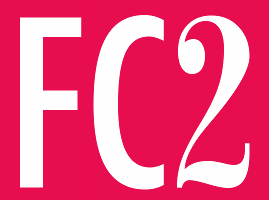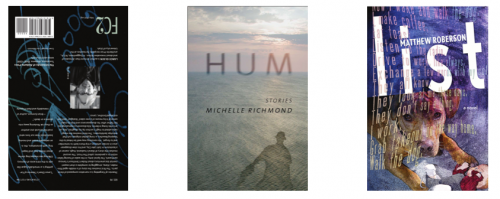WHAT BOX? Talking with Lance Olsen on FC2’s 40th Birthday
Founded in 1974, FC2 is one of America’s best-known ongoing literary experiments and progressive art communities. In honor of FC2’s fortieth birthday, publisher Lance Olsen has generously answered the following questions about publishing, longevity, and innovation.

***
Rachel: What is FC2?
Lance: FC2—short for Fiction Collective Two—is a small, independent, not-for-profit press run by and for innovative authors. One of America’s best-known ongoing literary experiments and progressive art communities, for the last 40 years FC2 has dedicated itself to bringing out work too challenging or heterodox for the commercial milieu. Originally founded in 1974 as Fiction Collective by a handful of writers—Ronald Sukenick, Raymond Federman, and Jonathan Baumbach among them—FC2 has so far published more than 200 books by more than 100 authors.
Rachel: What does FC2 mean to you?
Lance: FC2 is an ongoing investigation into what innovative writing means—and that meaning is continuously in flux. One of the great joys for me about our editorial meetings, which take place once or twice in the fall, and once or twice in the spring, is that they make up an ongoing conversation about such troubled and troubling terms as “cutting-edge,” “artistically adventurous,” and “experimental.”
Those terms mean something else now than they did in, say, 1974; will mean something next Tuesday than they did last Monday; will mean something different to one person than to another—which is to say such terms are inherently unstable ones, open to ongoing modification, depending on who you are, where you are, what you’ve read, and so on. That is, they are terms always-already in-process.
By my lights, at the heart of them are a series of implied questions: what is narrative? what are its assumptions? what are its politics and social dynamics? its limits? how does narrative engage with the problematics of representation? identity? temporality? gender? genre? ideas of “literature” and “the literary”? authorship? readership and the act of reading in the twenty-first century?
In other words, perhaps a fruitful way of approaching a tentative definition of such narrativity—represented with respect to FC2 by such diverse authors as Lucy Corin and Brian Evenson, Cris Mazza and Amelia Gray, Michael Martone and Stephen Graham Jones, Matt Kirkpatrick and Samuel R. Delany, Michael Joyce and Clarence Major, Vanessa Place and Hilary Plum, Joanna Ruocco and Leslie Scalapino, Melanie Rae Thon and Yuriy Tarnawsky, Steve Katz and Mac Wellman, Diane Williams and Lidia Yuknavitch—might be to suggest it is the sort that includes a self-reflective awareness of and engagement with theoretical inquiry, concerns, and obsessions.

The Lost Art of Forgetting: Lance Olsen’s Calendar of Regrets

Auguste D.
Imagine, Iphi said, how that scene doesn’t happen once. How it is happening right now, but also a thousand years ago and next week and next year and forty billion years after that.
Forever.
Forever and ever without end.
—Calendar of Regrets, January
*
In November 1901, at the mental hospital where he worked, Dr. Alois Alzheimer met a patient on his rounds named Auguste D., though she seldom remembered her name as such. Auguste D. was 51 years old, and she would become the first patient diagnosed with Alzheimer’s disease. In his interviews with Auguste D., Alzheimer uncovered a displaced psyche:
Auguste D.: “I have, so to speak, lost myself.”
:
Alzheimer: “Where are you?”
Auguste D.: “Here and everywhere—here and now—you mustn’t take offense.”
[Alzheimer: The Life of a Physician & The Career of a Disease, Maurer and Maurer]
Here is a woman who doesn’t know who she is in relation to the world, someone who has simultaneously lost herself and found herself everywhere, has become both corporeal rust and particulate dust.
We [read: society, read: artists] regard Auguste D.’s mental state with relative terror. She’s relegated to the realm of old, crazy people sequestered to wards that smell like vomit and bleach, folks who no longer matter. She’s the poster child for the hospitalized and sanitized. A symbol of deterioration and loss.
 In his new book, Calendar of Regrets, Lance Olsen is speaking the language of forgetting. He seems to ask, just what about any life—or any death—is different from Auguste D.’s sense-displacement? Don’t let me confuse you. Calendar of Regrets is not about Alzheimer’s disease, though Auguste D. would have been the perfect addition to Olsen’s wild cast of characters.
In his new book, Calendar of Regrets, Lance Olsen is speaking the language of forgetting. He seems to ask, just what about any life—or any death—is different from Auguste D.’s sense-displacement? Don’t let me confuse you. Calendar of Regrets is not about Alzheimer’s disease, though Auguste D. would have been the perfect addition to Olsen’s wild cast of characters.
Calendar of Regrets is flanked by the mind-meanderings of the painter Hieronymus Bosch in the hours after he’s been (ostensibly) poisoned and leaks into the 1986 attack on Dan Rather in which his assailant asked, “Kenneth, What’s the Frequency?” This book steps inside the heads of mythological figures, radical Christian terrorists, a pirate radio station host broadcasting from the Salton Sea, a vacationing family hijacked by a pretty girl with a bomb in her bag, a backpacker in southeast Asia, a teacher who has lost herself amidst the chatter of teenagers, a time-space traveler, a man born as a notebook, a body made up of borrowed organs, a fallen angel whose presence folds time into a loop for two little boys.
In the big-picture narrative, Olsen’s characters have been temporarily—temporally—displaced, all lost, “here and everywhere—here and now,” and they’re connected chapter to chapter (and month to month on a 12-month calendar) by thought-events across space and time. One chapter ends and the next story picks up its sentence fragment to begin anew, and then the stories fold back on themselves until we end up back where we started. Sometimes the connections between stories are tenuous, but I’m willing to follow because, after all, isn’t that how memory works?
November 1st, 2010 / 1:59 pm
pla(y)giarism versus plagiarism

Consider these two texts. The first was published on 28 June 2010 at Everyday Genius, the second was published yesterday at Metazen. The second author is very familiar with the first author.
The first text:
Rip off the wings of dragonflies
Rip off the wings of dragonflies, take their “spines,” their central lengths and a bit of paste, affix them down noses, between the eyes, one per customer. A dream.
The most important thing
The most important thing, about this pen, is to maintain inkflow: (the idea that) the ink must flow and continue flowing, at all times.
A Certain Angle
Remember, he said, when loaning it to me, this pen won’t write unless held at a certain angle.
It is said of the Emperor Fu Kang
“It is said of the Emperor Fu Kang: that He, with eyes unflinching, and a hand at peace, would have His enemies, and He had many, executed by decapitation. Further, that He would have their heads scooped out, embalmed then impregnated with magnet: the cavity that held the brain would be filled with iron, mined in the furthest West. During His ample leisure He enjoyed tossing these magnetized heads at a metallic surface. Actually in later years, with His son gaining influence, His Empire modernizing and so falling to ruin, this metal surface was often the door to an enormous refrigerator, then the largest to be found in the universe (opening it required two teams of oxen and an equator of rope). Inside this fridge the Emperor kept his foodstuffs, luxuriously imported at our expense, at a temperature most appropriate.”
